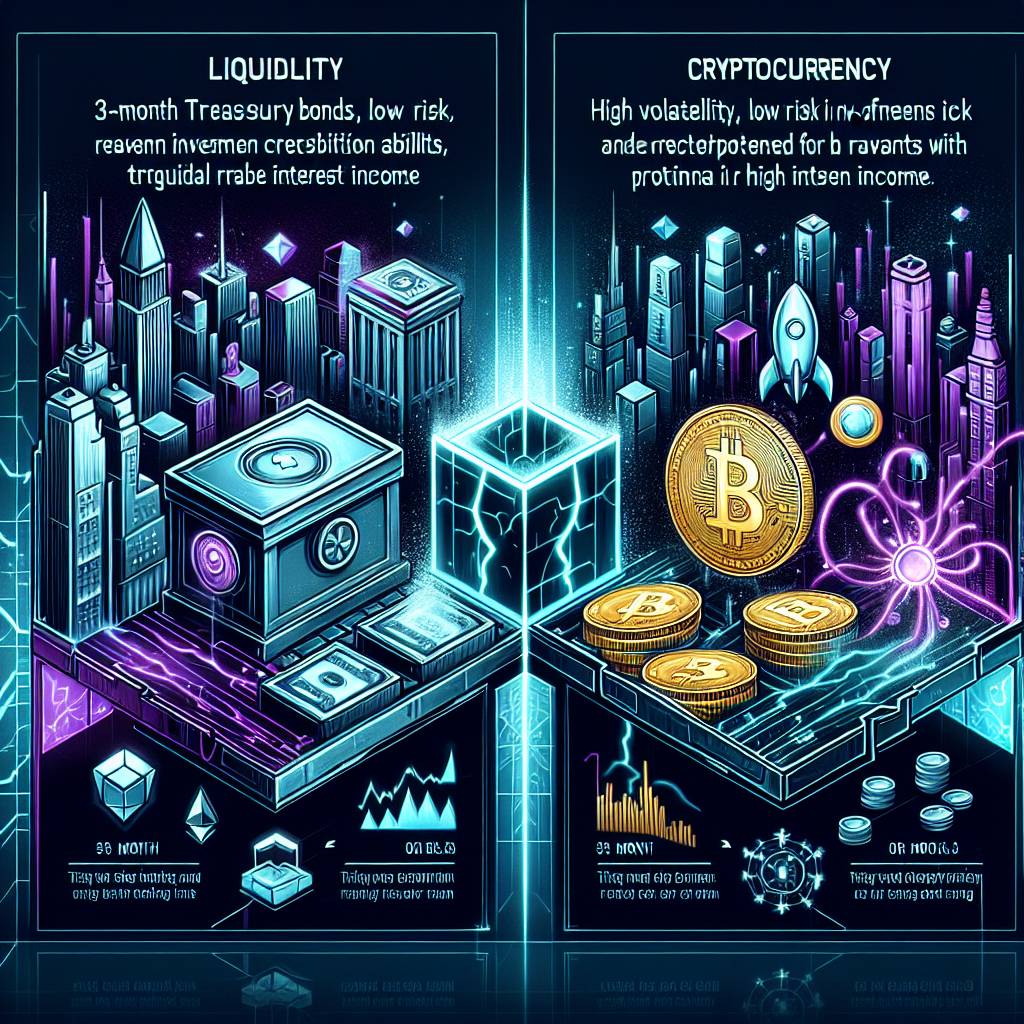What are the similarities and differences between oil futures and digital currency futures?
Can you explain the similarities and differences between oil futures and digital currency futures? How do they work and what are their main characteristics? Are there any specific factors that differentiate them?

5 answers
- Oil futures and digital currency futures have some similarities and differences. Both are financial derivatives that allow investors to speculate on the future price movements of their respective underlying assets. However, there are several key distinctions between the two. Oil futures are contracts that represent an agreement to buy or sell a specific quantity of oil at a predetermined price and date in the future. They are traded on commodity exchanges and are influenced by factors such as supply and demand, geopolitical events, and economic indicators. Digital currency futures, on the other hand, are contracts that enable investors to speculate on the future price of digital currencies like Bitcoin or Ethereum. They are traded on cryptocurrency exchanges and are influenced by factors such as market sentiment, regulatory developments, and technological advancements. One major difference between oil futures and digital currency futures is the underlying asset. Oil futures are based on physical commodities, while digital currency futures are based on virtual assets. This distinction affects the trading dynamics and risk factors associated with each type of futures contract. Another difference is the level of volatility. Oil futures tend to be influenced by global economic conditions and geopolitical events, which can result in significant price fluctuations. Digital currency futures, on the other hand, are known for their high volatility due to factors such as market sentiment and technological advancements. In terms of trading hours, oil futures typically have specified trading hours that align with the global oil market, while digital currency futures are available for trading 24/7. Overall, while both oil futures and digital currency futures offer opportunities for investors to speculate on price movements, they differ in terms of underlying assets, trading dynamics, risk factors, and volatility levels.
 Dec 27, 2021 · 3 years ago
Dec 27, 2021 · 3 years ago - Oil futures and digital currency futures may seem similar at first glance, but there are some important differences to consider. Let's break it down: Oil futures are contracts that allow investors to buy or sell a specific amount of oil at a predetermined price and date in the future. These contracts are traded on commodity exchanges and are influenced by factors such as global supply and demand, geopolitical events, and economic indicators. On the other hand, digital currency futures are contracts that enable investors to speculate on the future price of digital currencies like Bitcoin or Ethereum. These contracts are traded on cryptocurrency exchanges and are influenced by factors such as market sentiment, regulatory developments, and technological advancements. One key difference between the two is the underlying asset. Oil futures are based on physical commodities, while digital currency futures are based on virtual assets. This difference has implications for trading dynamics and risk factors. For example, oil futures are subject to factors like production levels, storage capacity, and transportation costs, while digital currency futures are more influenced by factors like market sentiment, adoption rates, and technological advancements. Another difference is the level of volatility. Oil futures are known for their price volatility, which can be influenced by factors like OPEC decisions, political unrest in oil-producing regions, and natural disasters. Digital currency futures, on the other hand, are known for their high volatility due to factors like market sentiment, regulatory announcements, and technological advancements. In terms of trading hours, oil futures typically have specified trading hours that align with the global oil market, while digital currency futures are available for trading 24/7. To summarize, while both oil futures and digital currency futures offer opportunities for investors to speculate on price movements, they differ in terms of underlying assets, trading dynamics, risk factors, and volatility levels.
 Dec 27, 2021 · 3 years ago
Dec 27, 2021 · 3 years ago - Oil futures and digital currency futures have some similarities and differences. Both are financial derivatives that allow investors to speculate on the future price movements of their respective underlying assets. However, there are several key distinctions between the two. Oil futures are contracts that represent an agreement to buy or sell a specific quantity of oil at a predetermined price and date in the future. They are traded on commodity exchanges and are influenced by factors such as supply and demand, geopolitical events, and economic indicators. Digital currency futures, on the other hand, are contracts that enable investors to speculate on the future price of digital currencies like Bitcoin or Ethereum. They are traded on cryptocurrency exchanges and are influenced by factors such as market sentiment, regulatory developments, and technological advancements. One major difference between oil futures and digital currency futures is the underlying asset. Oil futures are based on physical commodities, while digital currency futures are based on virtual assets. This distinction affects the trading dynamics and risk factors associated with each type of futures contract. Another difference is the level of volatility. Oil futures tend to be influenced by global economic conditions and geopolitical events, which can result in significant price fluctuations. Digital currency futures, on the other hand, are known for their high volatility due to factors such as market sentiment and technological advancements. In terms of trading hours, oil futures typically have specified trading hours that align with the global oil market, while digital currency futures are available for trading 24/7. Overall, while both oil futures and digital currency futures offer opportunities for investors to speculate on price movements, they differ in terms of underlying assets, trading dynamics, risk factors, and volatility levels.
 Dec 27, 2021 · 3 years ago
Dec 27, 2021 · 3 years ago - Oil futures and digital currency futures have some similarities and differences. Both are financial derivatives that allow investors to speculate on the future price movements of their respective underlying assets. However, there are several key distinctions between the two. Oil futures are contracts that represent an agreement to buy or sell a specific quantity of oil at a predetermined price and date in the future. They are traded on commodity exchanges and are influenced by factors such as supply and demand, geopolitical events, and economic indicators. Digital currency futures, on the other hand, are contracts that enable investors to speculate on the future price of digital currencies like Bitcoin or Ethereum. They are traded on cryptocurrency exchanges and are influenced by factors such as market sentiment, regulatory developments, and technological advancements. One major difference between oil futures and digital currency futures is the underlying asset. Oil futures are based on physical commodities, while digital currency futures are based on virtual assets. This distinction affects the trading dynamics and risk factors associated with each type of futures contract. Another difference is the level of volatility. Oil futures tend to be influenced by global economic conditions and geopolitical events, which can result in significant price fluctuations. Digital currency futures, on the other hand, are known for their high volatility due to factors such as market sentiment and technological advancements. In terms of trading hours, oil futures typically have specified trading hours that align with the global oil market, while digital currency futures are available for trading 24/7. Overall, while both oil futures and digital currency futures offer opportunities for investors to speculate on price movements, they differ in terms of underlying assets, trading dynamics, risk factors, and volatility levels.
 Dec 27, 2021 · 3 years ago
Dec 27, 2021 · 3 years ago - Oil futures and digital currency futures have some similarities and differences. Both are financial derivatives that allow investors to speculate on the future price movements of their respective underlying assets. However, there are several key distinctions between the two. Oil futures are contracts that represent an agreement to buy or sell a specific quantity of oil at a predetermined price and date in the future. They are traded on commodity exchanges and are influenced by factors such as supply and demand, geopolitical events, and economic indicators. Digital currency futures, on the other hand, are contracts that enable investors to speculate on the future price of digital currencies like Bitcoin or Ethereum. They are traded on cryptocurrency exchanges and are influenced by factors such as market sentiment, regulatory developments, and technological advancements. One major difference between oil futures and digital currency futures is the underlying asset. Oil futures are based on physical commodities, while digital currency futures are based on virtual assets. This distinction affects the trading dynamics and risk factors associated with each type of futures contract. Another difference is the level of volatility. Oil futures tend to be influenced by global economic conditions and geopolitical events, which can result in significant price fluctuations. Digital currency futures, on the other hand, are known for their high volatility due to factors such as market sentiment and technological advancements. In terms of trading hours, oil futures typically have specified trading hours that align with the global oil market, while digital currency futures are available for trading 24/7. Overall, while both oil futures and digital currency futures offer opportunities for investors to speculate on price movements, they differ in terms of underlying assets, trading dynamics, risk factors, and volatility levels.
 Dec 27, 2021 · 3 years ago
Dec 27, 2021 · 3 years ago
Related Tags
Hot Questions
- 92
What are the best practices for reporting cryptocurrency on my taxes?
- 85
Are there any special tax rules for crypto investors?
- 85
How can I protect my digital assets from hackers?
- 84
What are the best digital currencies to invest in right now?
- 40
What are the tax implications of using cryptocurrency?
- 34
What is the future of blockchain technology?
- 32
How can I minimize my tax liability when dealing with cryptocurrencies?
- 30
How can I buy Bitcoin with a credit card?
